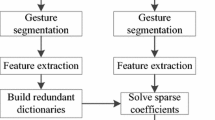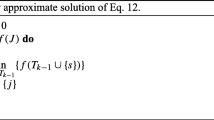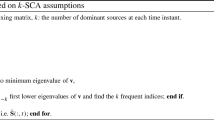Abstract
In this paper, a new algorithm for Sparse Component Analysis (SCA) or atomic decomposition on over-complete dictionaries is presented. The algorithm is essentially a method for obtaining sufficiently sparse solutions of underdetermined systems of linear equations. The solution obtained by the proposed algorithm is compared with the minimum ℓ1-norm solution achieved by Linear Programming (LP). It is experimentally shown that the proposed algorithm is about two orders of magnitude faster than the state-of-the-art ℓ1-magic, while providing the same (or better) accuracy.
Preview
Unable to display preview. Download preview PDF.
Similar content being viewed by others
References
Donoho, D.L.: For most large underdetermined systems of linear equations the minimal l1-norm solution is also the sparsest solution, Tech. Rep. (2004)
Bofill, P., Zibulevsky, M.: Underdetermined blind source separation using sparse representations. Signal Processing 81, 2353–2362 (2001)
Gribonval, R., Lesage, S.: A survey of sparse component analysis for blind source separation: principles, perspectives, and new challenges. In: Proceedings of ESANN 2006, April 2006, pp. 323–330 (2006)
Donoho, D.L., Elad, M., Temlyakov, V.: Stable recovery of sparse overcomplete representations in the presence of noise. IEEE Trans. Info. Theory 52(1), 6–18 (2006)
Movahedi, F., Mohimani, G.H., Babaie-Zadeh, M., Jutten, C.: Estimating the mixing matrix in sparse component analysis (SCA) based on partial k-dimensional subspace clustering, Neurocomputing (sumitted)
Washizawa, Y., Cichocki, A.: on-line k-plane clustering learning algorithm for sparse comopnent analysis. In: Proceedinds of ICASSP 2006, Toulouse (France), pp. 681–684 (2006)
Li, Y.Q., Cichocki, A., Amari, S.: Analysis of sparse representation and blind source separation. Neural Computation 16(6), 1193–1234 (2004)
Zibulevsky, M., Pearlmutter, B.A.: Blind source separation by sparse decomposition in a signal dictionary. Neural Computation 13(4), 863–882 (2001)
Georgiev, P.G., Theis, F.J., Cichocki, A.: Blind source separation and sparse component analysis for over-complete mixtures. In: Proceedings of ICASSP 2004, Montreal (Canada), May 2004, pp. 493–496 (2004)
Li, Y., Cichocki, A., Amari, S.: Sparse component analysis for blind source separation with less sensors than sources. In: ICA 2003, pp. 89–94 (2003)
Chen, S.S., Donoho, D.L., Saunders, M.A.: Atomic decomposition by basis pursuit. SIAM Journal on Scientific Computing 20(1), 33–61 (1999)
Donoho, D.L., Huo, X.: Uncertainty principles and ideal atomic decomposition. IEEE Trans. Inform. Theory 47(7), 2845–2862 (2001)
Elad, M., Bruckstein, A.: A generalized uncertainty principle and sparse representations in pairs of bases. IEEE Trans. Inform. Theory 48(9), 2558–2567 (2002)
Candes, E., Romberg, J.: ℓ1-Magic: Recovery of Sparse Signals via Convex Programming, URL: www.acm.caltech.edu/l1magic/downloads/l1magic.pdf
Mallat, S., Zhang, Z.: Matching pursuits with time-frequency dictionaries. IEEE Trans. on Signal Proc. 41(12), 3397–3415 (1993)
Krstulovic, S., Gribonval, R.: MPTK: Matching pursuit made tractable. In: ICASSP 2006 (2006)
Author information
Authors and Affiliations
Editor information
Rights and permissions
Copyright information
© 2007 Springer-Verlag Berlin Heidelberg
About this paper
Cite this paper
Mohimani, G.H., Babaie-Zadeh, M., Jutten, C. (2007). Fast Sparse Representation Based on Smoothed ℓ0 Norm. In: Davies, M.E., James, C.J., Abdallah, S.A., Plumbley, M.D. (eds) Independent Component Analysis and Signal Separation. ICA 2007. Lecture Notes in Computer Science, vol 4666. Springer, Berlin, Heidelberg. https://doi.org/10.1007/978-3-540-74494-8_49
Download citation
DOI: https://doi.org/10.1007/978-3-540-74494-8_49
Publisher Name: Springer, Berlin, Heidelberg
Print ISBN: 978-3-540-74493-1
Online ISBN: 978-3-540-74494-8
eBook Packages: Computer ScienceComputer Science (R0)




